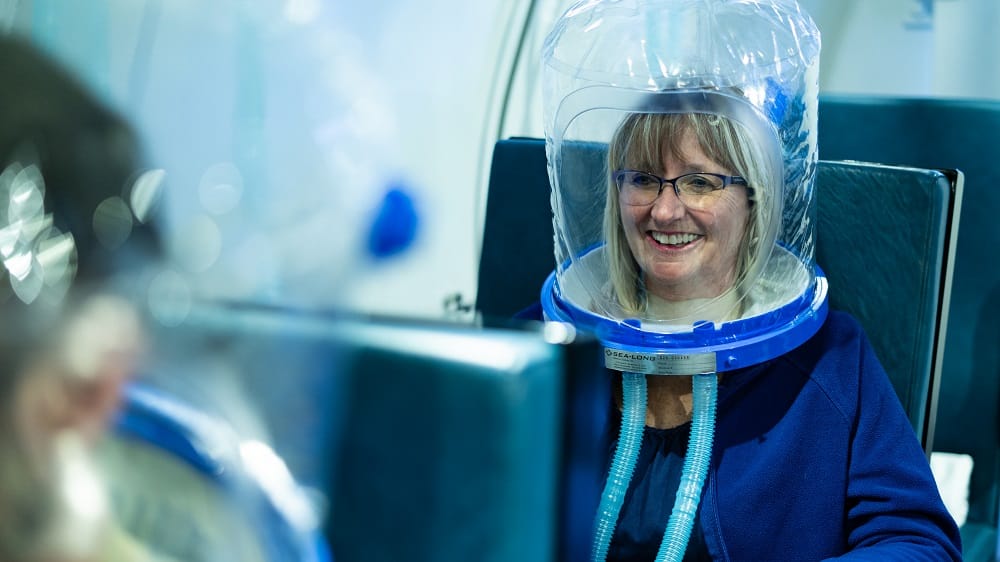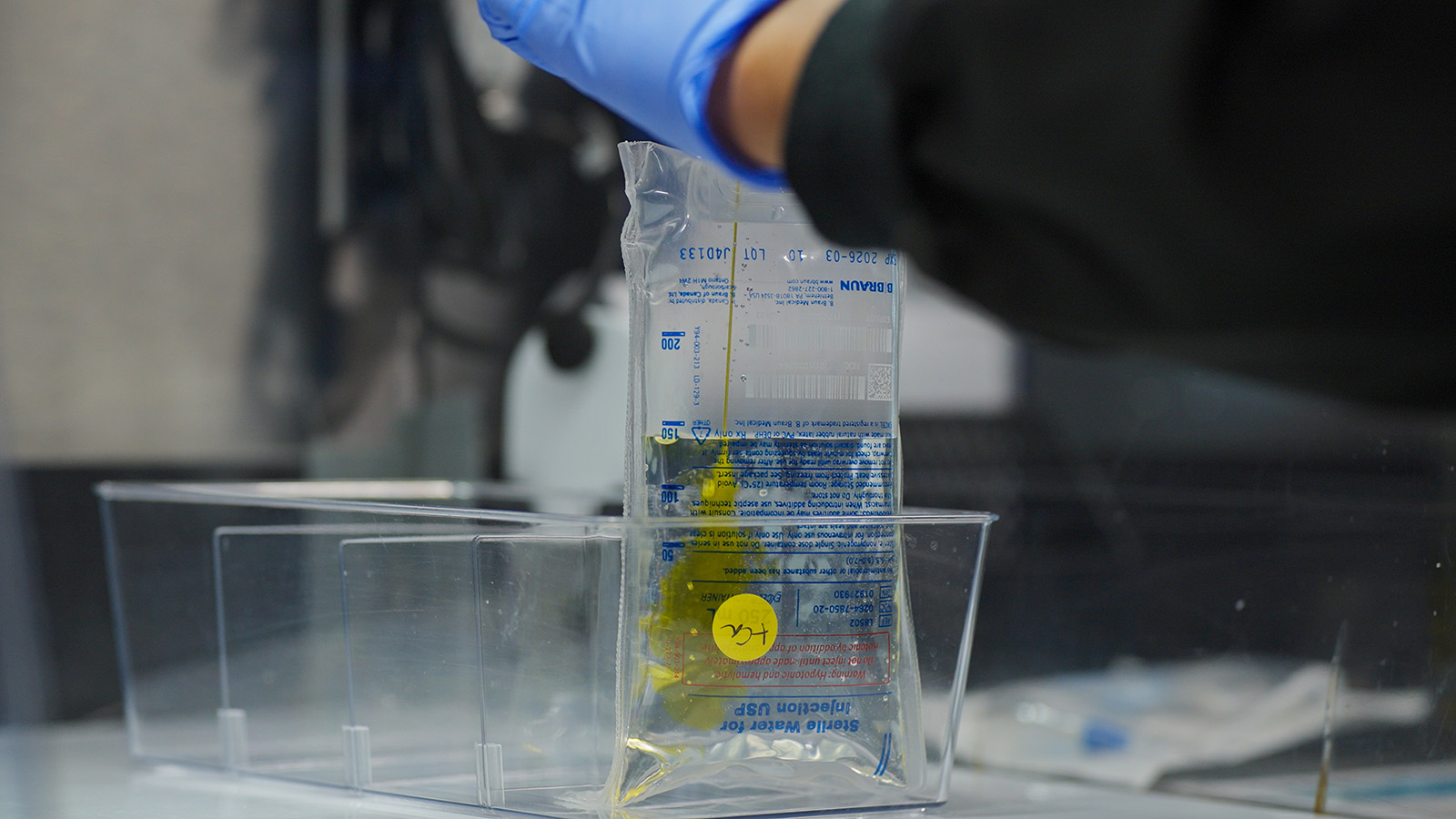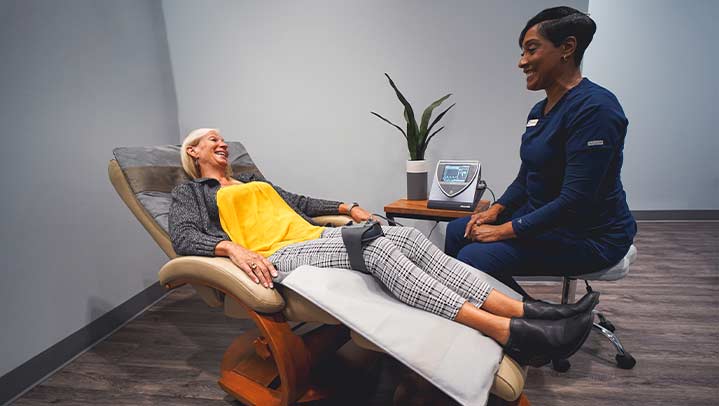Breast Cancer
We believe integrative medicine can support your overall health and help manage complex, long-term conditions such as breast cancer. Our therapies are designed to complement conventional treatments by targeting contributing factors such as inflammation, oxidative stress, impaired circulation, and poor nutrient absorption—factors that can impact recovery, immune function, and quality of life during and after breast cancer treatment.
Our treatment offerings are grounded in clinical research and focus on holistic, personalized approaches that work alongside your oncology care. Extivita provides therapies such as Hyperbaric Oxygen Therapy (HBOT), Pulsed Electromagnetic Field (PEMF) Therapy, Nutritional IV Therapy, and Infrared Sauna, all tailored to support the body’s natural healing capacity, improve circulation, enhance immune response, and reduce treatment-related side effects. By supporting the body at the cellular level, these therapies aim to help patients with breast cancer regain strength, improve energy, and promote long-term wellness.
Understanding Breast Cancer
Breast cancer develops when normal breast cells acquire genetic changes that cause them to grow and divide uncontrollably. These changes can be inherited, arise from random DNA errors, or be influenced by environmental and lifestyle factors. As cancer cells multiply, tumors may form and invade surrounding tissues, with the potential to spread to other parts of the body. Some tumors are driven by hormones such as estrogen and progesterone, while others are influenced by proteins like HER2 that accelerate cell growth.
As tumors expand, they can outgrow their blood supply, creating areas of low oxygen, or hypoxia. Cancer cells often thrive in these hypoxic environments by shifting their energy production, becoming more aggressive, and developing adaptive mechanisms that allow them to survive under stress, resist therapy, and invade surrounding tissues. Hypoxia also stimulates the growth of new blood vessels, further altering the tissue environment in ways that support tumor progression. Poor circulation, chronic inflammation, and toxin buildup in the body can contribute to these low-oxygen conditions, making it easier for cancer cells to persist and spread.
Inflammation is another critical factor in breast cancer development. While acute inflammation is part of the body’s healing process, chronic inflammation and oxidative stress can damage healthy cells, alter DNA, disrupt immune defenses, and create a microenvironment favorable to cancer survival. This ongoing biological stress not only initiates but also sustains cancer progression.
Finally, the body’s detoxification systems—the liver, kidneys, lymphatic system, and skin—play a major role in removing harmful substances. When these systems are burdened by environmental toxins, poor diet, or stress, the internal environment becomes more susceptible to disease processes, including breast cancer. Supporting detoxification and reducing toxin load not only decreases stress on the body but also strengthens immune defenses, making it harder for cancer cells to thrive.
Extivita Therapies for Breast Cancer

Hyperbaric Oxygen Therapy

Nutritional IV Therapy

Pulsed Electromagnetic Field Therapy (PEMF)

Infrared Sauna
Hyperbaric Oxygen Therapy (HBOT) for Breast Cancer
Hyperbaric Oxygen Therapy (HBOT) involves breathing 100% medical-grade oxygen inside a pressurized chamber, typically at 2.0 atmospheres absolute (ATA). This pressurization allows your blood plasma to carry significantly more oxygen than normal, delivering it deep into tissues—including areas affected by poor circulation, inflammation, or treatment-related damage.
For individuals with breast cancer, this increased oxygen delivery can help create an environment less favorable for cancer cells, which often thrive in low-oxygen (hypoxic) conditions. HBOT may also help reduce inflammation, support immune function, promote tissue repair after surgery or radiation, and improve nutrient delivery at the cellular level. By enhancing the body’s natural healing and recovery processes, HBOT serves as a powerful complementary therapy to conventional breast cancer treatments, supporting overall wellness and quality of life during and after care.
Breast Cancer Support Benefits
Improves Chemotherapy Effectiveness
By increasing oxygen levels in tissues, HBOT can help chemotherapy drugs penetrate more effectively into tumors. Cancer cells often thrive in low-oxygen environments, which can make them more resistant to treatment. HBOT helps reverse hypoxia, making cancer cells more vulnerable to the effects of chemotherapy.
Reduces Radiation Side Effects
For breast cancer patients who undergo radiation therapy, by increasing the oxygen levels in tissues, HBOT can help repair radiation-damaged tissue, reduce inflammation, and restore healthy blood flow to affected areas—supporting better long-term tissue health.

Reduces Chronic Inflammation
Chronic inflammation is a known contributor to cancer progression and treatment-related side effects. HBOT’s anti-inflammatory effects help calm the body’s inflammatory response, supporting immune balance and overall wellness during treatment.
Enhances Stem Cell Activity for Tissue Repair
HBOT has been shown to significantly increase the number and activity of circulating stem cells. These cells play a vital role in repairing damaged tissues, promoting post-surgery recovery, and supporting overall healing in individuals with breast cancer.
Promotes Angiogenesis for Better Circulation
HBOT stimulates the growth of new blood vessels (angiogenesis), improving nutrient and oxygen delivery to tissues. This is especially important for healing surgical sites, repairing treatment-damaged tissues, and supporting recovery in areas with poor circulation.
Supports Detoxification and Cellular Repair
By flooding the body with oxygen, HBOT enhances mitochondrial function, reduces oxidative stress, and supports natural detoxification processes. This creates a less favorable environment for cancer cells while promoting healthy cell regeneration.
IV Therapy for Breast Cancer
Nutritional IV Therapy delivers a targeted blend of vitamins, minerals, and antioxidants directly into your bloodstream—bypassing the digestive system for faster, more complete absorption. For individuals with breast cancer, this therapy can help correct nutritional deficiencies that may result from treatment, strengthen immune function, reduce inflammation, and support optimal cellular health. By providing the body with concentrated nutrients, Nutritional IV Therapy helps improve energy, promote tissue repair, and create an internal environment that supports healing during and after breast cancer care.

How IV Therapy Supports Breast Cancer
Strengthens Immune Function
Cancer treatments can weaken the immune system, making it harder for the body to fight infections and recover from illness. IV Therapy delivers immune-boosting vitamins and minerals directly into the bloodstream for rapid absorption, helping your body stay resilient during and after breast cancer treatment.
Restores Vital Nutrients Lost During Treatment
Chemotherapy, radiation, and surgery can deplete essential nutrients needed for healing and energy production. IV Therapy replenishes these vitamins, minerals, and antioxidants in a highly absorbable form, supporting faster recovery and overall well-being.
Reduces Inflammation and Supports Cellular Repair
Chronic inflammation can contribute to cancer progression and slow the healing process. IV Therapy provides targeted anti-inflammatory nutrients and antioxidants that help calm inflammation, protect healthy cells, and promote tissue repair at the cellular level.
Key IV Recommendations for Breast Cancer Support
Myers’ Cocktail IV
Components: B-complex vitamins, Vitamin C, Magnesium, and Calcium
- B-complex vitamins help support energy production and nerve health, which can be affected during cancer treatment.
- Vitamin C acts as a powerful antioxidant, supporting immune function and helping reduce inflammation that may occur during or after breast cancer therapy.
- Magnesium and Calcium support muscle, nerve, and bone health, which is important for maintaining overall strength during recovery.
High Dose Vitamin C IV
Components: Vitamin C (15g-75g), Magnesium, Calcium, and Potassium
- When given in high doses, Vitamin C can turn into a substance called hydrogen peroxide around tumor cells. Cancer cells can’t break down this peroxide very well, which makes them more likely to be damaged and destroyed by it. Healthy cells, on the other hand, have natural defenses that protect them from harm.
- High dose Vitamin C can work alongside regular cancer treatments to help slow tumor growth, aid in cancer cell death, strengthen the immune system, and improve overall well-being.
*Disclaimer: For doses above 15 grams, a G6PD blood test is required to make sure the treatment is safe.
Pulsed Electromagnetic Field (PEMF) Therapy for Breast Cancer
PEMF Therapy uses low-frequency, pulsing electromagnetic fields to help recharge your cells, improve circulation, and support tissue repair. By increasing oxygen delivery, reducing inflammation, and boosting cellular energy, this non-invasive therapy can aid recovery during and after breast cancer treatment. PEMF may help relieve discomfort, speed healing after surgery, and support the body’s natural defenses—making it a valuable complementary therapy alongside conventional care.
How PEMF Therapy Supports Breast Cancer
Supports Recovery After Surgery or Treatment
PEMF Therapy helps promote tissue repair and reduce swelling, which can speed recovery after breast cancer surgery or radiation. By improving circulation and cellular regeneration, it supports faster healing and less post-treatment discomfort.

Reduces Inflammation in the Body
Chronic inflammation can weaken the immune system and slow recovery during cancer treatment. PEMF Therapy helps calm inflammation at the cellular level, creating a healthier internal environment that supports healing and overall wellness.
Boosts Mitochondrial Function for Healing
PEMF Therapy improves mitochondrial function, increasing ATP production—the energy every cell needs to function. This boost in energy can help repair damaged tissues, improve stamina, and support the body’s natural defenses during and after breast cancer care.
Infrared Sauna for Breast Cancer
Infrared Sauna Therapy uses infrared light to gently heat the body directly, rather than just warming the air around you. This creates a more comfortable experience at lower temperatures compared to traditional saunas, typically between 120°F and 140°F (49°C–60°C). The deep-penetrating heat promotes relaxation, eases tension and supports overall wellness during and after breast cancer treatment.
How Infrared Sauna Supports Breast Cancer
Reduces Discomfort and Inflammation
Breast cancer treatments can leave the body achy and inflamed. Infrared heat penetrates deeply into muscles and tissues, helping reduce inflammation, ease soreness, and promote better circulation for improved comfort and recovery.
Enhance Circulation and Nutrient Delivery
Good blood flow is essential for delivering oxygen, nutrients, and immune support to tissues affected by treatment or surgery. Infrared therapy increases circulation throughout the body, helping to speed healing and restore energy levels.

Supports Detoxification and Cellular Health
Toxins and oxidative stress can weaken the body and slow recovery. Infrared saunas stimulate deep sweating, which helps the body release stored toxins. Regular detoxification supports a healthier internal environment, boosts immune function, and promotes overall cellular health.
Read to Begin Your Journey to Recovery?
Schedule a free wellness consultation to explore a personalized plan that supports your health and overall brain function.
Schedule Your Free Wellness Visit →
References:
- Imerb, Napatsorn, et al. “Hyperbaric oxygen therapy improves age induced bone dyshomeostasis in non-obese and obese conditions.” Life Sciences, vol. 295, 15 Apr. 2022, p. 120406, https://doi.org/10.1016/j.lfs.2022.120406.
- Feng, Jie, et al. “Hyperbaric oxygen therapy for the treatment of bone-related diseases.” International Journal of Molecular Sciences, vol. 26, no. 3, 26 Jan. 2025, p. 1067, https://doi.org/10.3390/ijms26031067.
- Imerb, Napatsorn, Chanisa Thonusin, Wasana Pratchayasakul, Krittikan Chanpaisaeng, et al. “Hyperbaric oxygen therapy exerts anti‐osteoporotic effects in obese and lean d‐galactose‐induced aged rats.” The FASEB Journal, vol. 37, no. 11, 19 Oct. 2023, https://doi.org/10.1096/fj.202301197rr.
- Oezel, Lisa, et al. “Effect of hyperbaric oxygen therapy (HBO) on osteoblasts of elderly patients on calcification and osteoprotegerin.” Journal of Orthopaedics, 3 July 2025, https://doi.org/10.1016/j.jor.2025.06.017.
- Brzezińska, Olga, et al. “Role of vitamin C in osteoporosis development and treatment—a literature review.” Nutrients, vol. 12, no. 8, 10 Aug. 2020, p. 2394, https://doi.org/10.3390/nu12082394.
- Fujita, Hirofumi, et al. “Glutathione accelerates osteoclast differentiation and inflammatory bone destruction.” Free Radical Research, vol. 53, no. 2, Feb. 2019, pp. 226–236, https://doi.org/10.1080/10715762.2018.1563782.
- Castiglioni, Sara, et al. “Magnesium and osteoporosis: Current state of knowledge and future research directions.” Nutrients, vol. 5, no. 8, 31 July 2013, pp. 3022–3033, https://doi.org/10.3390/nu5083022.
- Shi, Yitian, et al. “Nicotinamide mononucleotide enhances fracture healing by promoting skeletal stem cell proliferation.” Theranostics, vol. 14, no. 15, 16 Sept. 2024, pp. 5999–6015, https://doi.org/10.7150/thno.98149.
- Yamaguchi, Masayoshi. “Role of nutritional zinc in the prevention of osteoporosis.” Molecular and Cellular Biochemistry, vol. 338, no. 1–2, 25 Dec. 2009, pp. 241–254, https://doi.org/10.1007/s11010-009-0358-0.
- Zhang, Tianxiao, et al. “Pulsed electromagnetic fields as a promising therapy for glucocorticoid-induced osteoporosis.” Frontiers in Bioengineering and Biotechnology, vol. 11, 3 Mar. 2023, https://doi.org/10.3389/fbioe.2023.1103515.
- Ebid, Anwar, et al. “Long-term effect of full-body pulsed electromagnetic field and exercise protocol in the treatment of men with osteopenia or osteoporosis: A randomized placebo-controlled trial.” F1000Research, vol. 10, 29 Nov. 2021, p. 649, https://doi.org/10.12688/f1000research.54519.3.
- Huang, Jinming, et al. “Pulsed electromagnetic field promotes bone anabolism in postmenopausal osteoporosis through the Mir-6976/BMP/smad4 axis.” Journal of Tissue Engineering and Regenerative Medicine, vol. 2023, 3 June 2023, pp. 1–13, https://doi.org/10.1155/2023/8857436.
- Toro, Víctor, et al. “Effects of twelve sessions of high-temperature sauna baths on body composition in healthy young men.” International Journal of Environmental Research and Public Health, vol. 18, no. 9, 22 Apr. 2021, p. 4458, https://doi.org/10.3390/ijerph18094458.
- Tsagkaris, Christos, et al. “Infrared radiation in the management of musculoskeletal conditions and chronic pain: A systematic review.” European Journal of Investigation in Health, Psychology and Education, vol. 12, no. 3, 14 Mar. 2022, pp. 334–343, https://doi.org/10.3390/ejihpe12030024.




